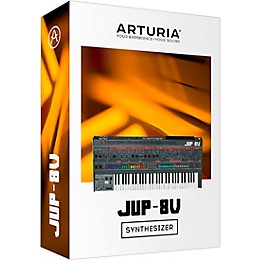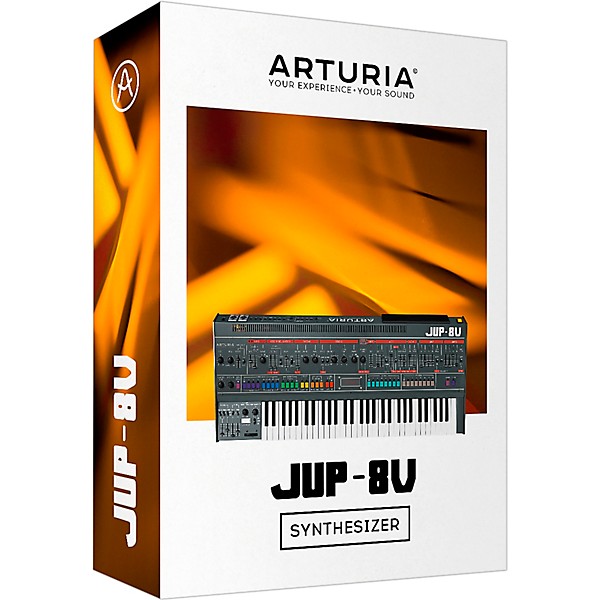Gear SpecialistBundlingMusician
Guitars
Guitars
Amps & Effects
Amps & Effects
Used & Vintage
Keyboards & MIDI
Keyboards & MIDI
Drums
Drums
DJ Equipment
DJ Equipment
Basses
Basses
Recording
Recording
Live Sound
Live Sound
Accessories
Accessories
Mics & Wireless
Mics & Wireless
Music Software
Music Software
Lighting
Lighting
- Popular Brands
Band & Orchestra
Band & Orchestra
Platinum Gear
Deals
New Arrivals
Download
Arturia JUP-8V Software Download
$149.00
6-month special financing^ + $7 back in Rewards** Limited time Learn More
Save on orders $199+ and get expert advice from a Gear Adviser
Need Help?

Description
Offering the same unique sound palette as the legendary Roland Jupiter 8, the JUP-8V virtual instrument is a sound designer's dream. Based on the latest version of TAE, JUP-8V also offers a host of modern features: an advanced step sequencer, a new line of dynamic effects, a module combining LFO's (called Galaxy), and lots more.
An Accurate Recreation of the Roland Jupiter-8
The legacy of the Roland Jupiter synthesizers is due to their unique voice architecture and design, creating sounds that were so unreal that they have to be heard. For many musicians no other synths in the world can create analog sounds as cool and as authentic as these and it's now available for computer-based studios in a virtual format.
The Jupiter-8 synth offers a very interesting combination of a high-pass, non-resonant filter and a low-pass resonant filter. The arpeggiator and the keyboard split make it a remarkable performance keyboard. Fast envelopes and precise oscillators confer to the Roland Jupiter-8's sounds its famous versatility.
A Virtual Instrument with Innovative Additions
With the JUP-8V virtual instrument, Arturia brings this magic back while adding a new generation of features to the virtual Roland synth opening a unique and contemporary sound palette:
The virtual instrument software's Galaxy allows the user to choose from different LFO types and intertwine them together into a single unique modulation source, giving a new evolving element to the sound of the Jupiter 8.
The Jupiter's step sequencer is also an assignable modulation source, which allows for easily generated patterns to be used to control the many interesting parameters of the virtual instrument's sound.
In addition to the step sequencer and Galaxy modulation sources, each voice of the virtual synth now has its own suite of creative effects, which can be inserted into the main synthesizer signal path in each voice. Key parameters from each effect can be modulated by chosen sources, adding a new contemporary dimension to the traditional subtractive synthesis sound of the original Jupiter 8 synth.
A Little Bit of History
Back to the early 80s, the Prophet 5 and Oberheim OB series dominated the polyphonic synthesizer market. Having that in mind, the Roland Jupiter-8's success, initiated in 1981, took everyone by storm.
But what made the Jupiter-8 so successful? Well, in terms of sonic possibilities, the synth complemented its competition by bringing something different. The Jupiter-8 was capable of creating very versatile sounds. You could easily make fat or crystal sounds with it. In fact, the Jupiter-8 synthesizer sounded the way it looked-sleek and polished.
The electro-pop community became quickly convinced by the qualities of the Jupiter-8 synthesizer. "Relax" by Frankie Goes to Hollywood was produced incorporating a Jupiter 8, and players such as Vince Clarke, John Foxx, and Martyn Ware were also using it. The path to classic status of the Jupiter started there. Other artists that have used The Jupiter-8 include Tangerine Dream, Underworld, Jean Michel Jarre, Depeche Mode, Prince, Gary Wright, Adrian Lee, Heaven 17, Kitaro, Elvis Costello, Tears for Fears, Huey Lewis and the News, Journey, Devo, Freddy Fresh, Simple Minds, Jan Hammer, and BT.
An Accurate Recreation of the Roland Jupiter-8
The legacy of the Roland Jupiter synthesizers is due to their unique voice architecture and design, creating sounds that were so unreal that they have to be heard. For many musicians no other synths in the world can create analog sounds as cool and as authentic as these and it's now available for computer-based studios in a virtual format.
The Jupiter-8 synth offers a very interesting combination of a high-pass, non-resonant filter and a low-pass resonant filter. The arpeggiator and the keyboard split make it a remarkable performance keyboard. Fast envelopes and precise oscillators confer to the Roland Jupiter-8's sounds its famous versatility.
A Virtual Instrument with Innovative Additions
With the JUP-8V virtual instrument, Arturia brings this magic back while adding a new generation of features to the virtual Roland synth opening a unique and contemporary sound palette:
The virtual instrument software's Galaxy allows the user to choose from different LFO types and intertwine them together into a single unique modulation source, giving a new evolving element to the sound of the Jupiter 8.
The Jupiter's step sequencer is also an assignable modulation source, which allows for easily generated patterns to be used to control the many interesting parameters of the virtual instrument's sound.
In addition to the step sequencer and Galaxy modulation sources, each voice of the virtual synth now has its own suite of creative effects, which can be inserted into the main synthesizer signal path in each voice. Key parameters from each effect can be modulated by chosen sources, adding a new contemporary dimension to the traditional subtractive synthesis sound of the original Jupiter 8 synth.
A Little Bit of History
Back to the early 80s, the Prophet 5 and Oberheim OB series dominated the polyphonic synthesizer market. Having that in mind, the Roland Jupiter-8's success, initiated in 1981, took everyone by storm.
But what made the Jupiter-8 so successful? Well, in terms of sonic possibilities, the synth complemented its competition by bringing something different. The Jupiter-8 was capable of creating very versatile sounds. You could easily make fat or crystal sounds with it. In fact, the Jupiter-8 synthesizer sounded the way it looked-sleek and polished.
The electro-pop community became quickly convinced by the qualities of the Jupiter-8 synthesizer. "Relax" by Frankie Goes to Hollywood was produced incorporating a Jupiter 8, and players such as Vince Clarke, John Foxx, and Martyn Ware were also using it. The path to classic status of the Jupiter started there. Other artists that have used The Jupiter-8 include Tangerine Dream, Underworld, Jean Michel Jarre, Depeche Mode, Prince, Gary Wright, Adrian Lee, Heaven 17, Kitaro, Elvis Costello, Tears for Fears, Huey Lewis and the News, Journey, Devo, Freddy Fresh, Simple Minds, Jan Hammer, and BT.

Features
- A revolutionary preset navigation system called SoundMap
- Ability to use NRPN MIDI messages for automation
- Presets now respond to modulation wheel
- Fresh batch of presets made by a selection of top sound designers
- MIDI RPN "pitch bend range" message is now recognized
- Increase of overall volume
- New e-licenser (old Syncrosoft) copy protection
- and numerous bug fixes
Specs
Required Minimum Configuration:
- PC: 512MB RAM; CPU 2GHz (Multiple cores recommended)
- Mac: 512MB RAM; CPU 2GHz (Multiple cores recommended)
- Windows: XP/VISTA/7
- Mac OS X: 10.4 or higher and Universal Binary
- Win: Standalone, VST, RTAS
- Mac: Standalone, VST, RTAS, AU
Reviews
Be the first to review the Product
Q&A
Have a question about this product? Our expert Gear Advisers have the answers.
No results but…
You can be the first to ask a new question.
It may be Answered within 48 hours.

.jpeg)

